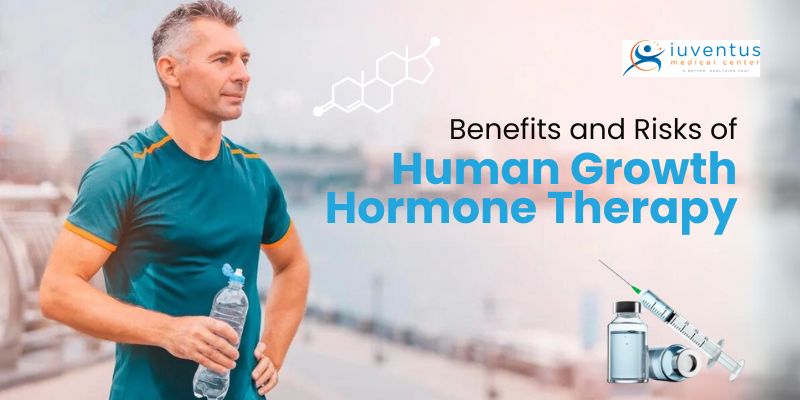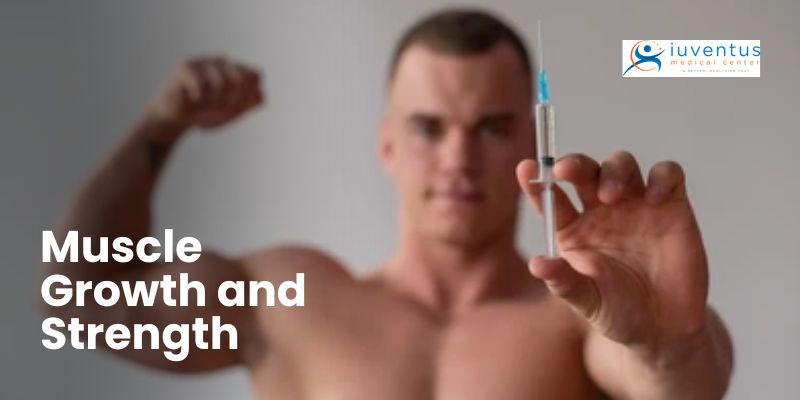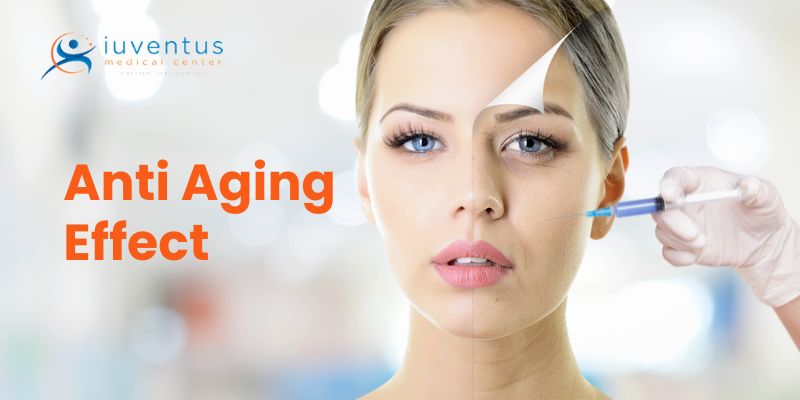Exploring the Benefits and Risks of Human Growth Hormone Therapy

Human Growth Hormone (HGH) therapy has gained significant attention in recent years for its potential to address various health concerns and promote anti-aging effects. However, like any medical intervention, it comes with benefits and risks. In this article, we will delve into the intricacies of HGH therapy, exploring its potential advantages and the associated risks.
Understanding Human Growth Hormone
Human Growth Hormone (HGH) is a vital hormone the pituitary gland produces, responsible for regulating growth, cell regeneration, and metabolism throughout life. Its levels peak during childhood and adolescence, driving physical growth and development. Beyond adolescence, HGH plays a crucial role in maintaining muscle mass, bone density, and overall health.
As we age, HGH production gradually declines, leading to age-related changes such as decreased muscle mass, increased body fat, reduced bone density, and diminished vitality. This decline in HGH levels has prompted interest in HGH therapy as a potential intervention to counteract these effects.
HGH therapy involves the administration of synthetic HGH to supplement the body’s natural production. It aims to restore HGH levels to a more youthful state, potentially offering benefits such as increased muscle mass, reduced body fat, improved bone density, and enhanced energy levels. However, it is essential to approach HGH therapy with caution, considering both its potential benefits and risks, and to seek guidance from qualified healthcare professionals before pursuing treatment.
Benefits of HGH Therapy
Muscle Growth and Strength

Human Growth Hormone (HGH) therapy is renowned for stimulating muscle growth and enhancing strength. By promoting the synthesis of new muscle tissue and increasing the size and number of muscle fibers, HGH can significantly increase muscle mass and strength. This makes it highly sought-after by athletes and bodybuilders looking to improve their physical performance and appearance.
Additionally, the effects of HGH on muscle growth can aid in the recovery process after intense exercise or injury, facilitating faster healing and muscle repair. However, it is crucial to use HGH therapy responsibly and under medical supervision to maximize benefits and minimize potential risks.
Fat Loss
Human Growth Hormone (HGH) therapy offers promising benefits for fat loss. By stimulating lipolysis and the breakdown of fats, HGH helps individuals achieve a leaner physique and improved body composition. This effect particularly appeals to those seeking to reduce stubborn body fat, especially around the abdomen and other trouble areas.
Additionally, HGH can enhance metabolic function, leading to increased calorie expenditure and more efficient fat utilization. As a result, individuals undergoing HGH therapy may experience reductions in body fat percentages and improvements in overall weight management. However, it is essential to approach HGH therapy with caution and under medical supervision to ensure safe and effective outcomes while minimizing potential side effects.
Bone Density
Human Growth Hormone (HGH) therapy holds promise for improving bone density and skeletal health. Through its stimulation of bone turnover, HGH promotes the formation of new bone tissue, enhancing bone strength and density. This is particularly beneficial for individuals at risk of osteoporosis or fractures due to age-related bone loss.
By increasing bone mineralization and reducing the risk of fractures, HGH therapy can improve overall bone health and reduce the likelihood of debilitating bone-related conditions. However, it is important to note that HGH therapy should be approached with caution and under medical supervision to ensure optimal outcomes and minimize the risk of potential side effects, including those related to bone health.
Anti-aging Effects

Human Growth Hormone (HGH) therapy is often lauded for its potential anti-aging effects. By stimulating cell regeneration and collagen production, HGH can lead to improvements in skin elasticity, reducing the appearance of wrinkles and fine lines. Additionally, HGH therapy may boost energy levels and vitality, enhancing overall well-being and quality of life.
These rejuvenating effects appeal to individuals seeking to combat the signs of aging and maintain a youthful appearance and vitality. However, it is essential to approach HGH therapy cautiously and under medical supervision to ensure safe and effective results while minimizing the risk of adverse effects.
Improved Cognitive Function
Human Growth Hormone (HGH) therapy may offer cognitive benefits, including enhanced memory, focus, and cognitive function. Some studies suggest that HGH can support neuronal growth and synaptic plasticity in the brain, leading to improvements in cognitive performance.
This effect is particularly relevant for aging individuals experiencing cognitive decline or seeking to maintain mental sharpness and clarity. However, further research is needed to fully understand the extent of HGH’s impact on cognitive function, and therapy should be administered cautiously under medical supervision.
Risks and Side Effects
- Acromegaly: Excessive HGH levels can lead to acromegaly, characterized by abnormal growth of bones and tissues, particularly in the face, hands, and feet.
- Cardiovascular Issues: HGH therapy may increase the risk of cardiovascular problems such as hypertension, cardiomyopathy, and atherosclerosis.
- Insulin Resistance: Elevated HGH levels can interfere with insulin sensitivity, potentially leading to diabetes or exacerbating existing insulin resistance.
- Fluid Retention: Some individuals may experience fluid retention, swelling, and joint pain as a side effect of HGH therapy.
- Cancer Risk: There are concerns that long-term HGH therapy may increase the risk of certain cancers, although conclusive evidence is lacking.
Considerations Before Starting HGH Therapy
- Consultation with a Healthcare Professional: Before embarking on HGH therapy, individuals should undergo a thorough evaluation by a qualified healthcare provider to assess their suitability for treatment and discuss potential risks and benefits.
- Monitoring and Dosage: A healthcare professional should closely monitor HGH therapy, with dosage tailored to individual needs, to minimize the risk of adverse effects.
- Lifestyle Factors: Adopting a healthy lifestyle, including regular exercise, balanced nutrition, and adequate sleep, can complement HGH therapy and optimize its benefits.
- Cost Considerations: HGH therapy can be expensive, and insurance coverage may vary. Individuals should consider the financial implications before committing to treatment.
- Long-Term Outlook: While HGH therapy may offer short-term benefits, its long-term effects remain controversial. Patients should weigh the potential benefits against the risks and consider alternative treatment options.
Conclusion
Human Growth Hormone therapy holds promise for addressing various health concerns and promoting anti-aging effects. However, it is not without risks; careful consideration, medical supervision, and personalized treatment are essential. Before pursuing HGH therapy, individuals should thoroughly evaluate the potential benefits and risks in consultation with a qualified healthcare professional.
